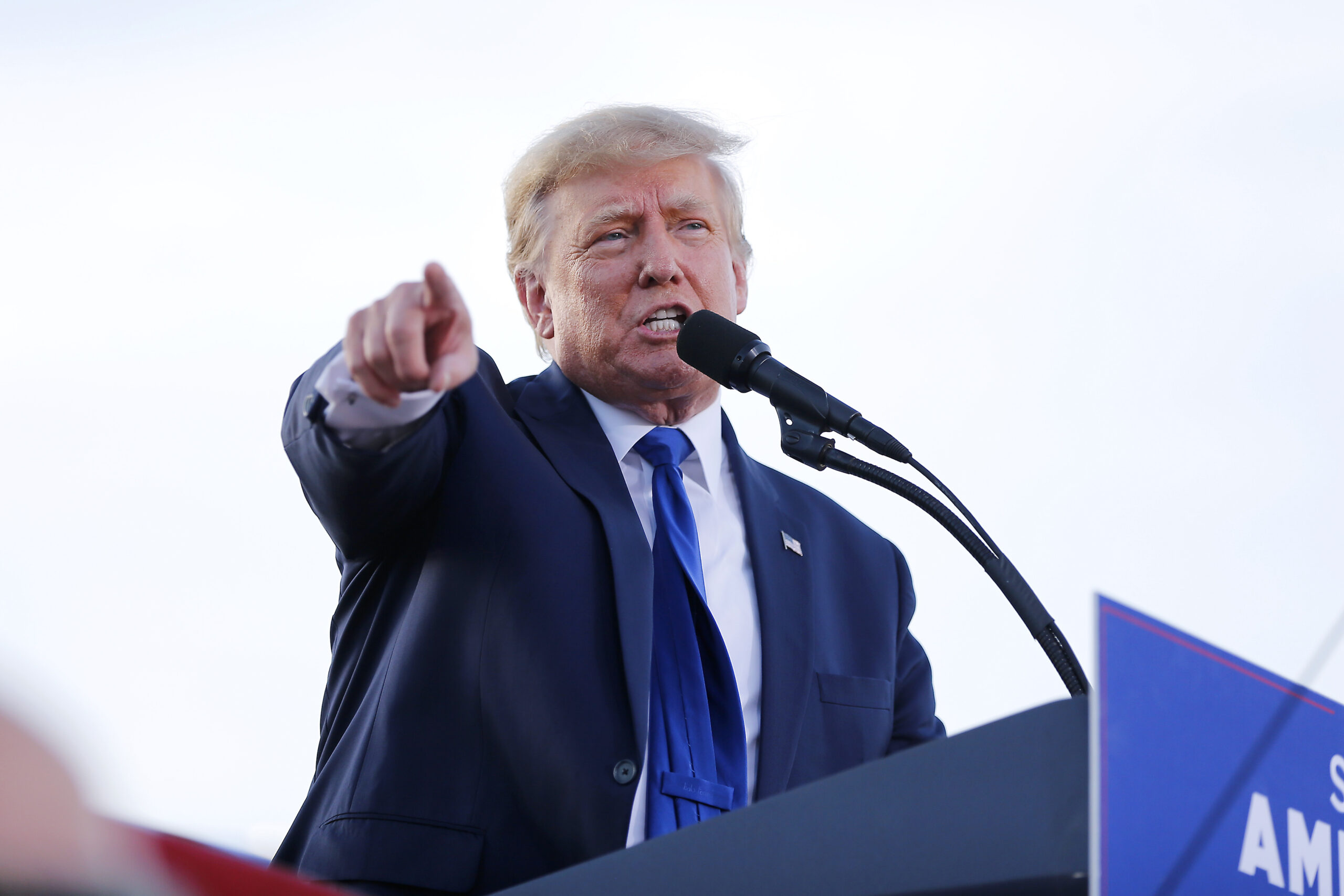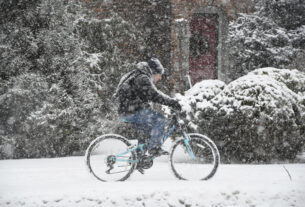In Arizona, Michigan and Pennsylvania, where Joe Biden beat then president Trump in 2020, several Republican candidates who have loudly echoed Trump’s false claims that the election was stolen are trying to win jobs as secretary of state, attorney general or governor in November.
CLICK ON PHOTO AND JOIN TO SECRET CHANNEL OF PRESIDENT TRUMP ON TELEGRAM!
SECRET CHANNEL HERE : https://t.me/+3iXrJ5bVUVViMDk0
The distinct prospect of some winning top state posts has triggered alarms from election watchdogs, Democrats and some GOP officials, who also worry about what could happen during the 2024 presidential election – especially if Trump is the nominee.
Prominent election deniers Kari Lake, a former Fox News anchor, and Mark Finchem, a state legislator, are vying to become Arizona’s next governor and secretary of state respectively. Lesser known is Abraham Hamadeh, the GOP candidate for attorney general, who reportedly boasted about committing voter fraud in 2008.
Michigan’s conspiracy-pushing candidates include the far-right lawyer Matthew DePerno for attorney general, and part-time community college instructor Kristina Karamo for secretary of state. Trump-backed Tudor Dixon is vying for the governor’s seat.
And in Pennsylvania, state Senator Doug Mastriano who was a key Trump ally scheming to block Biden’s win hopes to become governor, an office that, unlike certain states, has special power to name the secretary of state.
Election officials and watchdogs see these election deniers as part of a larger national phenomenon of about 290 candidates running for state and federal positions who have denied the 2020 presidential election results, as the Washington Post reported.
The secretary of state positions, which twelve election deniers are seeking, pose particular concern. If Karamo, Finchem or Mastriano – who can choose his secretary of state – triumph – at least one prominent purveyor of Trump’s falsehoods would play crucial roles overseeing election procedures for a state that could be pivotal in determining the outcome of the next presidential contest.
Should Mastriano take office, for example, he could reverse long-held voting standards by following through on a vow to decertify voting machines in counties where he suspects voting results were rigged.
Should Finchem win, he could repeat his moves in 2020: push to have Biden’s win decertified in three counties, though Trump lost the state by almost 10,000 votes, as a partisan recount reaffirmed, with no legal mechanism for decertification.
Coupled with the veto power of a gubernatorial seat, and the legal powers of the attorney general, these pyramids of election deniers could create election havoc and spur new voting conspiracies with an eye to putting the GOP presidential candidate in the White House.
“Americans need to understand how the legitimacy of a previous election – and in some ways, the entire electoral process – has for the first time in modern history, been questioned by candidates for the very positions that will run the next elections,” Ian Vandewalker, a senior counsel for the Democracy program at the Brennan Center for Justice, told the Guardian.
The three have sparked a mix of congressional, justice department, and state scrutiny by investigators. Even under the federal government’s eye, they have continued to push conspiracy theories at home, fueling further denialism, a barrage of lawsuits to curb voting rights, and drives to aggressively monitor polls and hire poll workers.
Last month, America First Legal, a group founded by former Trump senior adviser Stephen Miller and Trump’s ex-chief of staff Mark Meadows, filed lawsuits in two Pennsylvania counties to curb the use of ballot drop boxes, which have also come under attack from conservatives in Arizona who have begun surveilling these boxes.
The Trump backed Conservative Partnership Institute, which boasts Meadows and lawyer Cleta Mitchell who runs its “election integrity network” after helping Trump’s efforts to overturn the 2020 results, has spent months recruiting poll workers and poll watchers in these three states and others, spurring potential voter intimidation concerns.
Further, the America Project, which was founded by multimillionaire Patrick Byrne and retired Lt Gen Michael Flynn, who met Trump at the White House on 18 December 2020, where schemes to overturn the election were bandied about, has begun a seven-figure drive to train “election reform activists” in the three states and five others.
Election analysts and officials warn of rising threats they are facing from disgruntled workers and outside disruptors. And veteran election officials and watchdog groups say they’re worried about the wave of dangerous claims by election deniers running for office and their allies.
“Poll-watchers and election observers play an important role in safeguarding the integrity of elections, so it’s important that those positions not be misused to intentionally disrupt or prevent registered voters from voting,” Al Schmidt, a former Republican election commissioner in Philadelphia who oversaw elections for a decade, told the Guardian.
Schmidt, who now leads the Committee of Seventy, a non-partisan group working to strengthen democracy, added: “There is a very real danger when election officials are seen as the enemy or the opposition. The mindset of these election denialist groups is a concern because of the behavior it can lead to. As we’ve seen, it’s led to threats of violence and motivated people to try to physically disrupt the casting and counting of votes.”
Election watchdogs are troubled about what would happen should some election deniers win their races next month, or contest the results if they clearly lose.
Arizona’s Lake and Finchem have sparked strong fears as they continue to trumpet Trump’s erroneous claims about major voting fraud in 2020. Both according to recent polls have real shots of winning the races.
Hamadeh, the Republican candidate for attorney general, has denied the results of the 2020 election and has focused his campaign ironically on “election protection” to “rebuild the confidence of our elections by prosecuting election fraud to the fullest extent of the law”.
Finchem has shown no regrets about promoting falsehoods about the 2020 election or Trump’s role on January 6. On that day this year, he brazenly and falsely tweeted that the “real insurrection” was that Democrats in his state “rigged the vote in Arizona with tens of thousands of fraudulent votes”.
During a televised debate last month with his Democratic rival Adrian Fontes, Finchem revealed he had been interviewed by the justice department and the House select committee investigating the Trump-fueled insurrection as a “witness not as a suspect”.
Meanwhile, Lake’s rhetorical falsehoods about Trump’s loss to Biden have gone on for months. She went further this month during a CNN appearance by refusing three times to say whether she would accept the midterm results should she lose.
During a February CPAC conference in Florida, Lake said: “We know that if we have another election that is stolen from us, we’re going to lose this country forever.” Then, during the primary campaign which she won in August, Lake told journalists that if she had been governor before she would not have certified the state’s electoral results.
“Deep down, I think we all know this illegitimate fool in the White House – I feel sorry for him – didn’t win,” she told the New York Times in August.
Lake has asked her Twitter followers if they would “be willing to take a shift watching a dropbox to catch potential ballot mules,” as election deniers have ratcheted up false charges about their safety.
“It’s a perfectly safe method of voting and arguably safer than voting by mail because it removes the post office intermediary,” said Maricopa county recorder Stephen Richer, who helps oversee the elections for the state’s largest county.
“For election administrators in Arizona, it’s an endless game of conspiracy theory Whac-A-Mole,” Richer added. “For election denying candidates, the truth doesn’t matter. They just have to keep the game going–to fundraise, to stoke passion and energy, and, most of all, to show loyalty to former president Trump.”
Bill Gates, the GOP chairman of the Maricopa board of supervisors, foresees more election disputes.
“There is a movement by election deniers. It’s the lawsuits and the harassing public record requests,” he said, which he noted have accelerated as early voting neared in mid October.
Gates’ fears are underscored by a lawsuit that Lake and Finchem filed this year to get rid of all voting machines that Trump ally and multimillionaire Mike Lindell underwrote and that is now on appeal to Arizona’s court of appeals after it was rejected by a lower court.
“We’ve requested sanctions against Finchem and Lake. There was no basis in law or fact to bring that lawsuit.”



